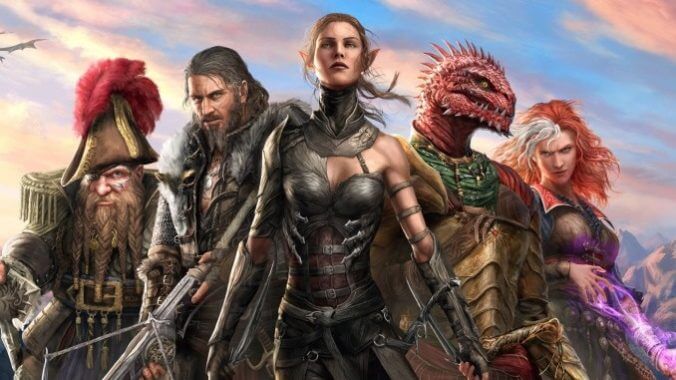I’ve been playing Larian Studios’ Divinity: Original Sin 2 for over two years and I still don’t quite know what’s going on. Okay, I know that it’s a top-down, turn-based CRPG. I know its world is inhabited by humans, elves, dwarves, undead, and giant lizard people. I know that my party and I are all Godwoken, chosen by various dying gods to help them return to life. We can maybe achieve some divinity of our own while we are at it, if we don’t kill each other for power first. I know there are divine right empires, secretive spymasters, extensive criminal networks, and ancient religions. The details, though, evade me.
This is largely because I’m playing Original Sin 2 with three friends, primarily as a tactics game. It’s an excuse to hang out and crush our collective heads against a dense and enthralling puzzle. So we chat over cutscenes and work out battle strategies during dialogue trees. My friends who know the game better rush ahead to get good items or activate their favorite questlines. For me, it feels like being on a road trip when someone else is driving. I can identify landscapes, but the individual ecosystems, towns, economies all blur as music warms and voices chatter.
Despite the fuzziness in that exact experience, Divinity: Original Sin 2 is obviously an expansive, expressive RPG. It’s easy to make this claim via systemic complexity. Divinity has a dense character creation engine and layered systems of economics and magic. But the expansiveness of Original Sin 2 is best felt, not calculated. There’s a principle in some tabletop role-playing games, like Dungeon World, that the game master should be a fan of the characters. Original Sin 2 is an efficient engine for that feeling.
In the game’s multiplayer, you rely on your teammates. The turn-based format ensures that their decisions are fully in your view. You only click a button to activate an ability, but your little avatar stomps its feet and shapes its hands into symbols. One of my friends plays a cannibal, necromancer elf. She heals herself with bone and marrow, draws power from the blood she sheds, explodes the corpses she creates with fire and bone. She is accompanied by two lizard mages. The first is colorful and elemental. She places remnants of nature across the battlefield, which rage to her tune. The last commands creations of earth and sky, summoning dread incarnates from oil. They emerge from the flame, crowned with wings like some dread monarch.
Don’t worry, your character will get their own glories, but it’s always in collaboration with the other party members. My character and the fourth member of the party, Echo, is a battle mage, specializing in taking hits, healing friends, and freezing enemies. My character is the least tuned toward outright killing, but possibly the most tuned to setting others up for success. I love knocking out the last bit of armor, so that next turn my friend can deal huge damage. I love restoring an ally’s armor to healing just at the right time. I love cheering with the group chat as one pulls off something especially beautiful or impressive. Those moments are managed by all of us working in conjunction. We know each other’s builds, how to shape encounters around our strengths and weaknesses. Our expressions feed into each other.
I want to play the game on my own at some point. I’m curious about how its ponderous, technical combat will change shape when I’m the only one making decisions. I’m curious about having a more considered, specific view of its narrative. However, I don’t think that a lonesome experience will grant me a more complete picture of Divinity: Original Sin 2‘s strengths. They are already self-evident.
When I play tabletop role-playing games, I tend to favor leaner, more emotive play. Like most computer RPGs, Original Sin 2 favors violence as the primary means of expression. There are expansive and differing ways to solve problems, but most of them involve blood. Furthermore, Original Sin 2 can struggle with smaller gestures. Sometimes it lets each player character talk to each other about what just happened, with pre-written dialogue choices. It’s as awkward and inexpressive as it sounds. These kinds of conversations would be had more richly in a far more open tabletop setting.
But one RPG cannot do everything, and Divinity: Original Sin 2 is an incredible argument for specific, enveloping expansion. It is very difficult to argue that Original Sin 2‘s combat is not expressive, that it does not communicate power and character. I’m still somewhat wary of the scale of Baldur’s Gate 3, the latest game from Larian Studios. My favorite role-playing games of recent years have opted for something akin to smallness. The single life in Citizen Sleeper. The dwindling coastline of Disco Elysium. Pentiment‘s village, hill, and monastery. I feel the call, as much as anyone else in this space, to games that will eat my free time alive, but I want to move further away from them. But after Divinity: Original Sin 2, I also feel that if anyone can pull off a massive RPG, can make it feel beguiling, expressive, and vivid, it’s Larian. However good Baldur’s Gate 3 turns out to be, I will be there with this group, building little people together.
Grace Benfell is a queer woman, critic, and aspiring fan fiction author. She writes on her blog Grace in the Machine and can be found @grace_machine on Twitter.
